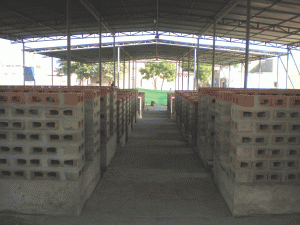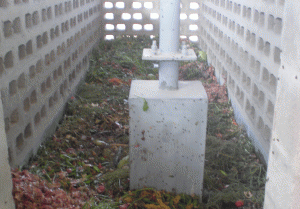Khuda Ki Basti-3 (KKB-3), located in Qaiser Town, near Surjani Town in northern Karachi, is an innovative housing settlement pioneered by the NGO Saiban, as a model project to provide low-cost affordable legal housing to low-income residents of slums (kachi abadis) in Karachi.
Previously building on the two other settlements in Hyderabad and Gharo, the basti now holds over 20,000 people in approximately 1,800 developed homes with adequate infrastructure and education, health and other facilities.
One of the biggest issues in the basti that was left unresolved was the large amounts of trash gene-rated and left unattended everyday at the basti. Once the population in KKB-3 began to increase, there were many attempts by the administration to lobby the local municipal services to management trash in the basti.
Unfortunately, after 3 years, there was no regular support from the local municipal services to manage the waste for the basti. The lack of resources available to the local government made it impossible to deliver these critical services to the KKB-3 citizens. The residents had created 16 mini-disposal sites (kachra kundis) in the neighbourhood for disposal. Some residents were also employing sweepers to collect the trash and deposit in the self-designated areas.
Saiban acquired funding from an international agency as well as technical help from Waste Concern, a Bangladesh-based NGO with a long history of implementing effective waste-management solutions, to launch a Solid Waste Compositing plant in KKB-3. The plant staff consists of a team of sweepers (who collect and manage the compost), volunteers, and a general compost manager. After doing community surveys, it was determined that while most residents were unsatisfied with the current waste-disposal services, few were using sweepers to collect waste from their own homes. Currently, sweepers are employed to collect waste from home, but soon each household will be paying a nominal fee of Rs. 30 to cover the cost.

View of the composite boxes as a visitor enters the plant. The "holes' allow for oxygen to enter the compost.
Other community development challenges include mobilizing people regarding the storage of waste within homes (reduce plastic bags and employ old boxes/bins) and waste separation at the household level. Special focus will be school-aged children and community women residents, both of whom can give training to their peers.







I am a Visiting lecturer at NED University Architecture Department .
Currently I am a masters of Environmental design at AIOU . I am compiling my thesis on Solid Waste management of a Slum Settlement of Karachi . And would very much like to visit the plant to take this as a case study . Your initiative is very interesting.
I am working in Pakistan Agricultural Research Council, university campus as Director. It would be highly appreciated if I can be invited to visit your setup.
Dr. Tahir Anwar
Director
Pesticide Research Institute
PARC, University Campus Karachi
0300-2364173